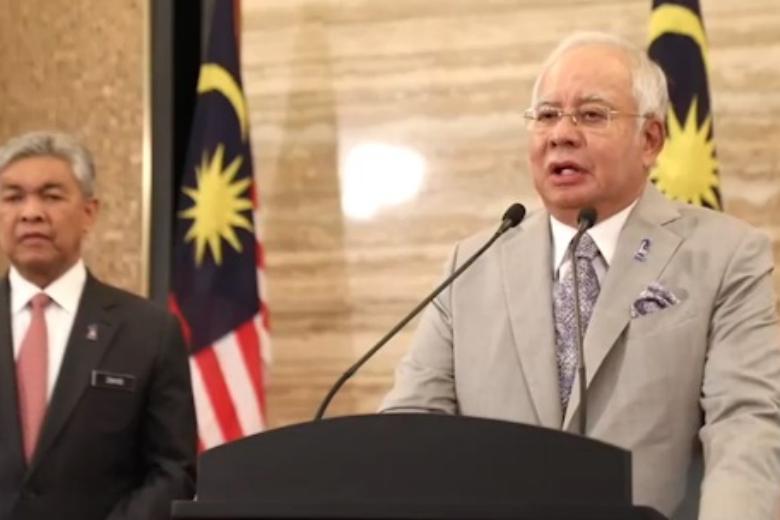Malaysia's Parliament to be dissolved on Saturday, paving way for all-out election battle
Sign up now: Get ST's newsletters delivered to your inbox

Prime Minister Najib Razak was given an audience by the King on Friday morning (April 6) ahead of a Cabinet meeting, reported The Star, before making the announcement live on national television at 12.15pm.
PHOTO: SCREENGRAB FROM LIVESTREAM
Follow topic:
KUALA LUMPUR - Malaysia's Parliament will be dissolved on Saturday (April 7), paving the way for a heated election in which the government and opposition have painted as a "do-or-die" battle.
The Election Commission will now decide the date for the polls, which has to be held within 60 days of the dissolution. But with the Muslim fasting month beginning in mid-May, expectations are that the 15 million Malaysians will go to the ballot box in early May.
Prime Minister Najib Razak made the announcement on live national television at 12.15pm on Friday (April 6).
"I had an audience with the King this morning to request for parliament to be dissolved on April 7, 2018," said Datuk Seri Najib in his televised address. He said the King consented to his request.
"Therefore, I advise heads of state governments to seek an audience with their rulers to dissolve their own state assemblies," he said. Both parliamentary and state assembly seats will be contested in Malaysia's 14th general election, aside from Sarawak which held its state polls in 2016.
Several chief ministers like Selangor's Azmin Ali and Sabah's Musa Aman have also sought audiences with their heads of states Friday afternoon, with the rest to follow suit by next week.
Several chief ministers like Selangor's Azmin Ali and Sabah's Musa Aman have also sought audiences with their heads of states Friday afternoon, with the rest to follow suit by next week.
Mr Najib took the opportunity in his address to list the achievements of his ruling coalition Barisan Nasional (BN) and seek a new mandate from the electorate.
"If BN wins again, we promise and vow to do our best with a wider and more inclusive, more comprehensive transformation. The transformation journey cannot stop here. The world has changed and we should not regress or return to the bleak and dark past," he said, in a thinly veiled reference to predecessor Mahathir Mohamad.
Tun Mahathir. who was in power for 22 years until 2003, has led the opposition since last year after Umno ignored his calls for the party to ditch Mr Najib over graft allegations.
The election momentum accelerated this past week as BN fast-tracked key motions through Parliament covering redrawn electoral boundaries and fake news, and announced a raft of handouts to crucial votebanks such as the country's 1.6 million civil servants.
The authorities also suspended the party of former premier-turned-opposition chief Mahathir Mohamad, while jailed opposition icon Anwar Ibrahim has been denied access to his lawyer.
Dr Mahathir's entry into the opposition sees an alliance of once bitter foes who insist that a continued Najib administration will wreck the nation's finances and institutions.
Dr Mahathir, who was premier for 22 years until 2003, told The Straits Times in a recent interview: "If he wins, he will be very strong. So this is our last opportunity to unseat him. If we lose this, there is no future. He will die (one day), but the legacy that he leaves behind will kill all the prime ministers who follow. They cannot solve this."
In the other corner of the ring, the BN component parties had earlier said that a poor performance in this election could spell the end for their parties. BN had lost its customary two-thirds parliamentary supermajority in the 2008 election, and then the popular vote for the first time in the 2013 election.
At the last Umno annual congress in December, Mr Najib described the national polls as "the father of all elections".
"If the nation falls to the wrong and irresponsible party, everything that we and our fathers have built tirelessly will crash and be destroyed before our own eyes," he said.
Although recent opinion polls show the government's popularity is waning, analysts believe that Dr Mahathir's Pakatan Harapan (PH) pact faces an uphill battle to unseat the government.
This is due to expected multi-cornered fights, as the pact's former ally Parti Islam SeMalaysia (PAS) has chosen to contest independently in at least 130 of the 222 parliamentary wards. They are expected to pull away crucial Malay support from PH.
Support from the Malays, the country's dominant ethnic community, has been crucial to Mr Najib's grip on power.
In 2013, the once-dominant BN garnered just 47 per cent of votes against the opposition's 51 per cent, but still secured a comfortable majority of Parliamentary seats thanks to electoral boundaries which favour rural-based Malays.
More than 60 per cent of Malays backed BN then, giving it 133 of the 222 wards in Parliament and leaving the opposition with 89 seats, a distant 23 seats away from federal power.

